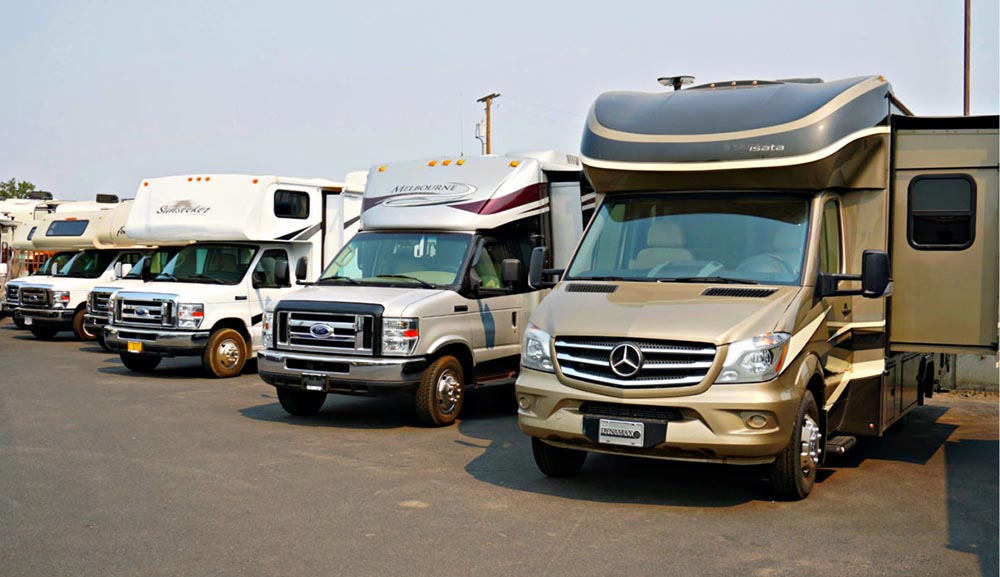
You’ve made the big decision to buy an RV. That may be the easiest part. Now what?
After researching the many types of recreational vehicles on the market, you may have even decided on the type of rig that best suits your needs (travel trailer, fifth wheel, motorhome, etc). But there’s still a very important question lurking out there as your search: should I get a new or used RV?
The implications are big, and may even determine how much you enjoy your “new-to-you” home on wheels and the lifestyle experiences you have with it.
Most articles on this topic do not take a point of view on this choice. They simply outline the pros and cons of each. I’m going out on a limb here: My husband and I bought a new motorhome, but wished we had purchased a used one. Here are our tips for weighing your options and making your own decision, though we hope you’ll agree with our experience once you’ve read i (and save yourself some money!).
Sure, there are many factors that go into this decision. And we ended up with many check marks on the positive side of the ledger for choosing a brand-new RV. But for us, the enormous difference in cost outweighed all other factors.
Our Decision to Buy New
So much of the research we did suggested buying used was the way to go. But because we were such newbies, going with a used RV felt really scary. What if we inherit a mess? What if we have repairs that we don’t know anything about? We let our fears drive our decision. So we bought new—and even bought an expensive extended warranty for peace of mind.
As I mentioned, there are several pros to spending for a new rig. I’ll share those first, and then talk about the cons—including the big one.
The Pros
Buying a new RV is like buying a new car: It smells good, it’s clean, everything looks nice, no one has used it, and there are essentially no miles on the odometer. It’s really easy to get seduced by that “new coach” scent.
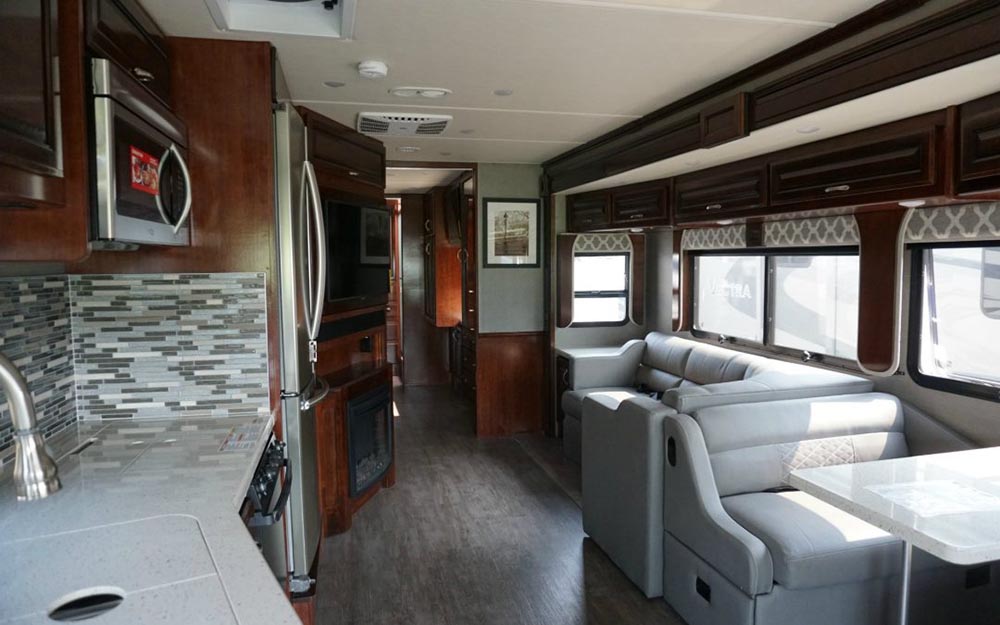
New models also come with the latest features, technologies, and interior styles. This can be very beneficial, especially if you don’t want to do a bunch of upgrades on an older model.
Additionally, new manufactured rigs come with a warranty—usually for a year. Many things that could go wrong are covered, however, do your research and understand what’s in your warranty.
Download The Essential RV Buyer’s Self-Check Guide with RV Self-Inspection Checklist
Don’t buy an RV without this RV Buyer’s Self-Check Guide! Learn about the 5 major things to look for when purchasing an RV and use the included four-page RV Self-Inspection checklist to make sure you don’t miss a thing!
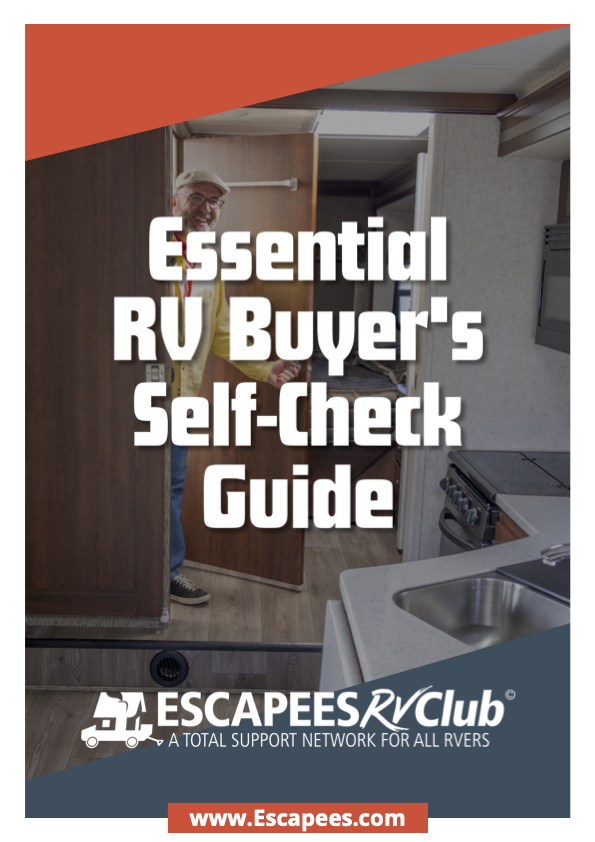
The Cons
Simply put, you are going to lose money when you get a new RV. It will happen swiftly and fiercely—like the minute you sign the papers and drive it off the lot. It hasn’t physically changed, but it’s now considered a pre-owned vehicle. And the immediate depreciation can be as much as 20%.
Imagine, on the high end, you’ve just bought a $250,000 diesel pusher and made a sizeable down payment with your hard-earned money. Poof! There goes as much as $50,000. I know this is an extreme example, but it’s relative.
I’ve met many RVers who did plenty of research, only to find out within a year or two their purchase no longer meets their travel needs. They decided to finance their RV, and usually end up being upside down in their loan and are forced to keep their RV, or take a sizeable loss to get out of it. Ouch!
And even before you buy new, there’s confusion around the real market value of the vehicle. Everyone knows not to pay the full sticker price for a new rig, but what is the real number the dealer is willing to sell it for? Negotiations can be really awkward—especially if there’s any lack of trust or sales pressure.
If that’s not enough, a new RV hasn’t been broken in yet. Your first year may feel more like a revolving door into the dealership than a carefree highway. That happened to us when we had a slide that wouldn’t open or close merely three weeks into our full-time travels. Your first trip in your new purchase is often referred to as your “shakedown” trip, meaning you find many of the issues the manufacturer and dealer missed.
Buying A Used RV
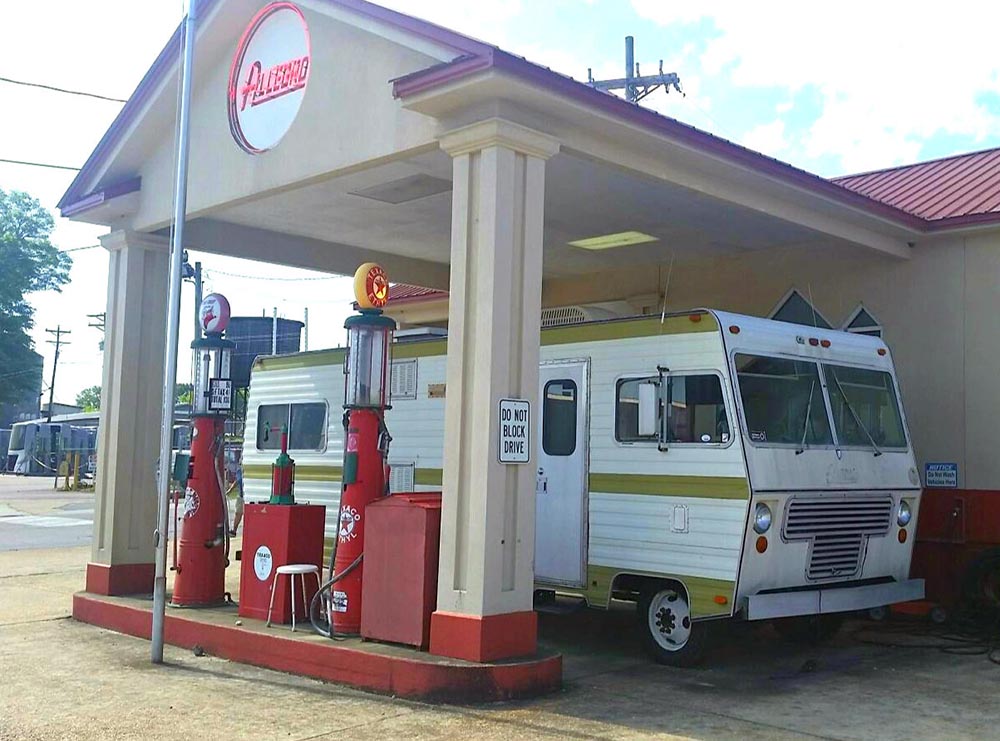
To be fair, I have never purchased a used RV. However, I have talked to many people who have—and even others who have bought both new and used over the years. Very few have said they would recommend buying new. In fact, it seems the more familiar people become with RVs, the more likely they are to go with a used one.
The Pros
It’s probably obvious that the main benefit to getting a used RV is saving a boatload (I mean, RVload) of money. If you’re patient enough, and do your research, you may even find the exact new RV you want—just a couple years old and with hardly any differences from the new model specifications.
This actually happened to us, but we let it get away. We were so new to RVing that even when we had the opportunity to get what we wanted at 30-40% off the new price, we simply weren’t confident enough to close the deal. And a few months later, we purchased nearly the same model at new RV prices. Visualize me kicking myself now.
Also, the used RV market is quite transparent and efficient. Online websites such as RV Trader and RVUSA have thousands of listings nationwide for used RVs being sold by dealerships and private parties. By looking at these listings, you can get a general sense for the true market value of the RV you’re interested in. Also, fair market values are available on NADA Guides—similar to Kelley Blue Book values for autos.
In addition to saving money, a used RV is more broken in than a new one. Things that are going to break in the first few years have been fixed. Also, the prior owner(s) may have completed upgrades, added features like newer technologies, or installed satellite TV or solar.
There are many benefits to buying used, but like anything be diligent in your research because there are some downsides, too.
The Cons
Yes, you could end up with a lemon. But you could also get a lemon, even if it’s new. If the previous owner(s) don’t disclose something, like water or structural damage, that is a giant pie in the face. Be sure to thoroughly inspect the vehicle, or pay to have a professional do it. If the seller is serious, they may share the inspection costs, or even be willing to pay for it entirely.
Depending on where you live, you may have to travel quite far to find the right used rig. But this would also likely be the case for buying new. I’ve heard stories of people chasing around the country to find the perfect used RV, so do your research and be selective.
While you’ll save money by buying used, you could still end up paying too much for it. Maybe the owner did custom work and wants to get their money out of it. In this case, you have to decide what you are willing to pay for. Again, do your research on a fair market price and negotiate from there.
One last possible downside is that a used RV doesn’t automatically come with a warranty. Depending on where you purchase it, you may need to get your own warranty coverage.
Download The Essential RV Buyer’s Self-Check Guide with RV Self-Inspection Checklist
Don’t buy an RV without this RV Buyer’s Self-Check Guide! Learn about the 5 major things to look for when purchasing an RV and use the included four-page RV Self-Inspection checklist to make sure you don’t miss a thing!

The Winner: Buy a Used RV
Hear that? That’s the joyful sound of chirping birds because you made a great decision to buy a used RV. If you bought new and disagree with this post, that’s okay. We did, too. To be honest, now that we’ve worked out the kinks, we really like our coach—we just wished we had paid less for it.
We’re mostly happy with the performance of our motorhome, and the interiors are in relatively good condition. Oh, except the torn up couch and chairs from our cat’s claws. Whoever purchases this from us someday should definitely negotiate a “cat scratch” discount.
Did you buy a used or new RV? How was your experience?

Author
Camille Attell - Author and Coach
Camille is the founding partner of MoreThanAWheelin.com, a website specializing in travel, RV life, remote work, and the emotional journey. A lifelong learner and longtime instructor, she is passionate about helping others live a life of freedom and flexibility. She is the creator of Remote Work School, an online school helping people find remote work opportunities. In 2016, she and her husband, Bryce, left their corporate jobs to travel and work full-time. When not working and helping others, Camille enjoys hiking, snowboarding, culture and the arts, and photography.
Did you like this post? Pin it to Pinterest!
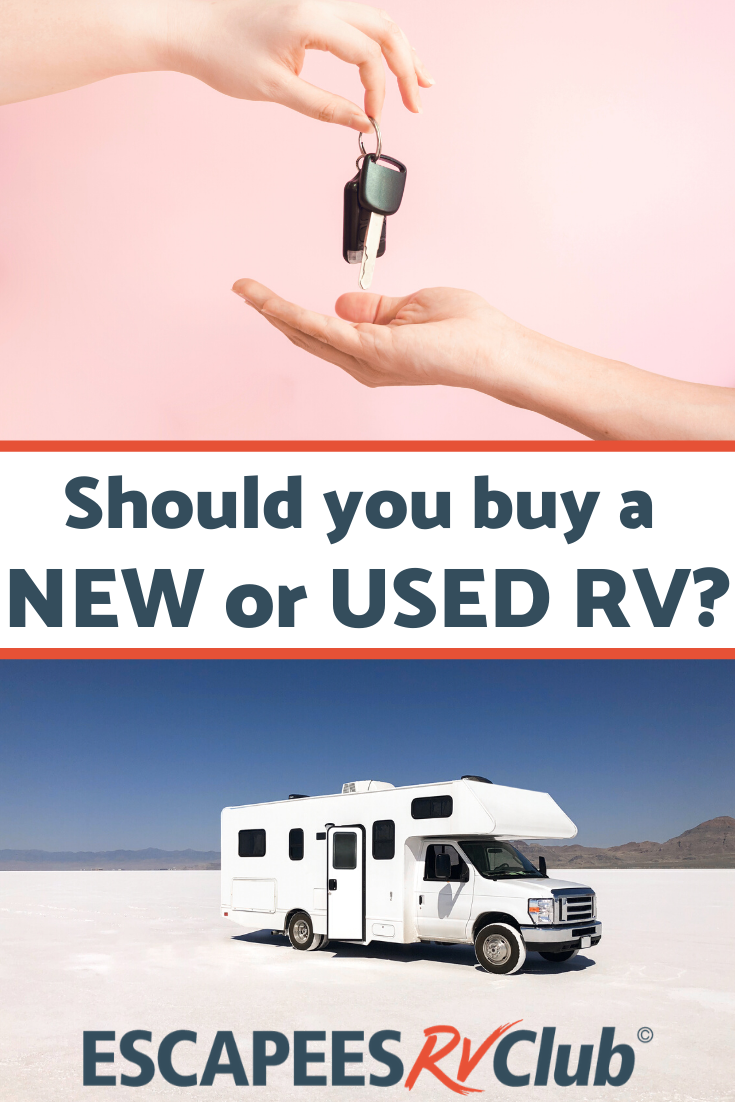

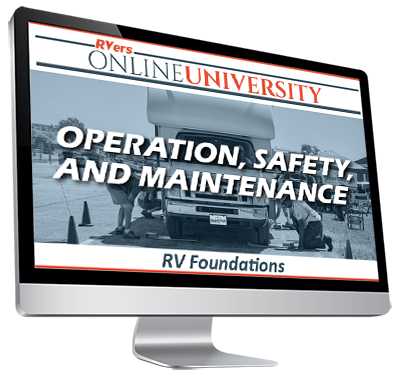



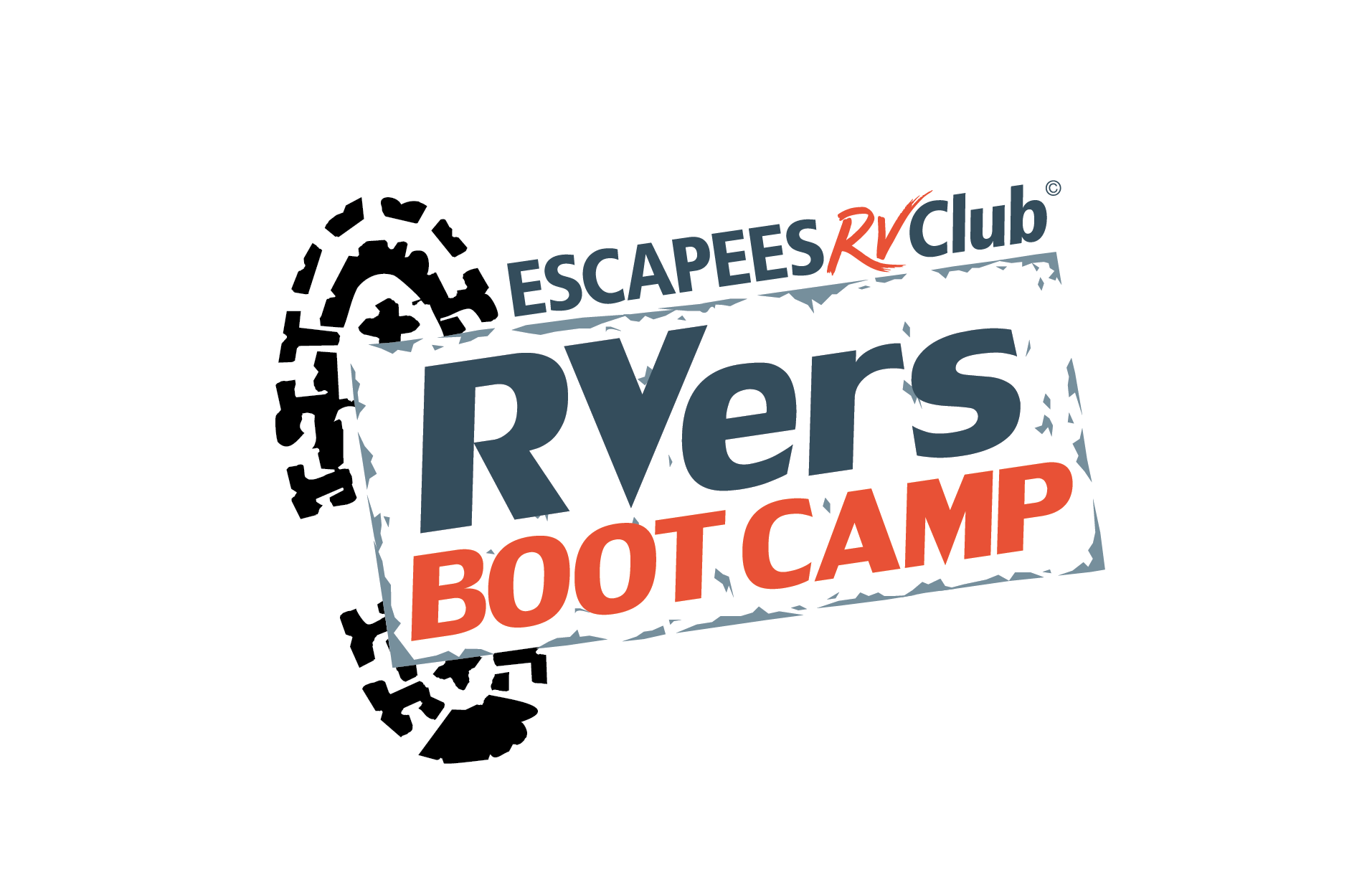


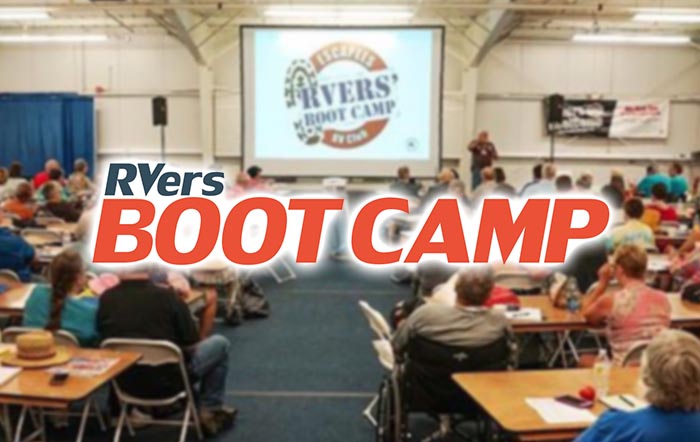
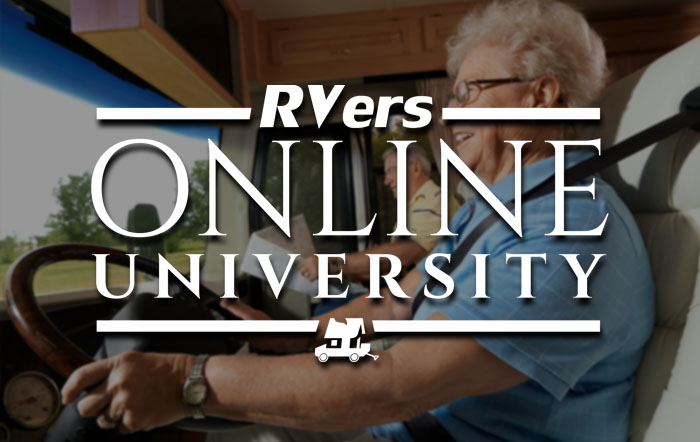

23 Responses
I like how you talked about researching before making the decision to buy an RV brand-new is critical since it’s an investment on the same level as getting a car and getting a new RV also means that you have the manufacturer’s warranty–usually up to a year. At the same time, one should also consider that getting an RV new also means that it’s open to initial upgrades and being free of known RV issues for the first few years of owning one new. If I had the chance to buy a new RV I would make sure to look around for something that would definitely get my money’s worth.
After 25 years and buying both new, the first 2 times and used the 3rd and last time, I’m happy with each decision that I made at that time. It’s a very personal choice and I can only tell you what worked for me and my family. I was self employed and struggling. I wanted to get my family out so we bought a new slide on camper. We are a family of 5 and at the time they were 7,6, & 4 years old. That worked great for 4 years but soon the kids were bigger, the weekends started to happen more often and loading and unloading the camper on the truck for a weekend started to become a chore and deterrent. 12 to 15 times per year and many successive weekends. I also enjoyed a enclosed trailer and it was a big chore to set up behind the rear overhang of the camper. I lost about 50% on this purchase after 4 years.
I purchased a new diesel pusher. I could just turn the key and go on the weekends. The kids kept the close inside and the refrigerator was all stocked. It took several years to work out all of the “new bugs that the factory missed. I did all the work myself and learned all about Diesel pushers along the way. I drove that for about 125,000 miles. It was a mid grade DP and after 125K miles and 19 years, on mostly California highways, the drive train was still doing great, but the coach was needing attention. I sold it for about 8% of my purchase price. Or as I like to think about a $1 per mile of depreciation
Last year we purchased a high end DP, used. It needed a lot of work, but after a thorough going over and 3 hours of negotiating, I purchased this Coach used from a private party. It has great bones, great skin, just some repairs that a prior owner was unwilling or not able to perform. Nothing major, just work. After about 10 days of misc attention and repairs, I believe now, I can have 10 to 15 years of life out of this unit and only loose 12 to 15K per year and probably spend $4 k to $ 6 k per years on maintenance (tires, battery’s, general repairs by the manufacturer) with a 10 to 15K mile per year usage.
I have no regrets. I would do it all over again. But don’t decide purely for financial reasons. All of these are expensive and some days are better than others owning a coach and traveling, but I loved spending quality time, 1 on 1, with the family on our outings
I will say that this is probably the most expensive way to travel compared to a cabin or 3 week destination type vacations. This “expense” study, does not fit here but a topic that I have debated with other many times over the years.
Another important thing to consider when deciding whether to buy used or new, is the interest rate on the loan. New RVs, like autos, have lower interest rates, and used has higher. Also, with new purchases, the length of the loan is longer, making payments lower, while used rates are not only higher, but financial institutions grant less time on those loans, often to the point of you making almost the same payment for new or used. The only real difference is the total amount paid in the long run.
I appreciate what you said about new RVs and how they come with the latest technology and features. Buying an RV is a worthwhile investment if you plan to use it often. I want to buy an RV for my family, so I’ll find a dealer in my area that has amazing and affordable models.
Nice article, very well written – friendly, clear, concise, high value content in a minimum of words. You write very well.
We have never bought a new RV (and we have owned six) and never would, precisely for the reasons you articulated. We bought our current class A diesel pusher in 2008 with 17,000 miles on the Cummins 400. It now has 107,000 and is going strong. It sold new for $271K and we paid $124K. We have added some things along the way, but are very confident we made the right choice. My wife would like to have a washer and a dryer, but we bought a winter RV port home in Surprise (AZ) that has everything the coach doesn’t. So many friends that bought new spent more time in the shop than on the road. Great discussion of pros and cons.
I have bought two RV’s new and one RV used and have owned RV’s for 20 years. I could add that in my cases the problem issues were higher in the used unit. The issues came mostly from the age of the unit which in my opinion is a maintenance and end of life reality for many of the components which make up the RV. AC units, refrigerators, tires, batteries, awnings, drive train, suspension etc. all have failure rates that increase with age. Short term owners my benefit from buying used, if they are careful to buy ones in good condition that had been cared for. Long term buyers may benefit from new units (although most will require some factory recall and repair issues) where once the initial problems are resolved they should expect years of low maintenance and repair costs before things start to wear out or end of life. Both of my older units required expensive repairs, including all that I listed as examples above. They felt like they had became too expensive to own even, though the depreciation was much lower.
After owning 6 different RVs since our first in 1973, and having bought 3 used and 3 new, I think that the key to a satisfactory purchase is research and education. Far too many RV buyers choose the RV based more on emotion than on logic. As a career electrical/mechanical service tech, I probably had some advantage in my early purchasing experience but it still requires study to know what you really need & want. Our second, fifth, and sixth RVs were new and looking back I believe that we did reasonably well in each one. A fair purchase price is much easier to discover with a used RV than with new because it is so difficult to find different makes and models that are of the same quality, workmanship, and configuration, while RV Trader and similar locations make comparisons of used RV less difficult. When we bought our new Class A for fulltime living we wanted new so configured it with a local dealer and then took that configuration sheet and shared it with prices covered with 9 dealers selling the same brand in three states, inviting each one to bid on our purchase. Total variation in price form highest to lowest was about 8% of MSRP & nealy 12% of our actual purchase price. We did have to drive about 120 miles and cross a state line to make the purchase.
My first RV was used and when I realized I like RVing I bought a new one. I like the fact that nobody owned it before me and price-wise it was not that bad. But I definitely had some issues with it which had to be fixed.
I have purchased 4 types of used RV’s. Generally, the higher end ones…better built in most cases so less to go wrong.
Every RV that I have ever bought I have checked over by an industry professional. This is very important as many times I have been saved from buying a lemon as they find things that I can’t or don’t see. It might cost a little money to have a professional look over it, but it is cheaper than having an RV that falls apart after a small amount of time (water leaks are the worst I think).
That article was VERY WELL WRITTEN.
My wife and I were first time buyers in 2005. We bought a used 1985 YELLOWSTONE 5th wheel and are still using it to this day. It does the same thing a brand new one does. Sure we have had to put some money into it, but it was well worth the money. Keeps us dry, cold in the summer and warm in the winter.
We are getting ready to retire and hit the road full time in a few years and are always on the hunt for that right unit for the right price.
Many rv parks will ask you how old your rig is. It doesn’t matter how well you have taken care of it or its appearance. They reject units that are over 10 years old.
Hi Sharon!
You’re correct that there are parks that disallow RVs that are more than 10 years old. However, there are also plenty willing to waive this restriction if you can demonstrate that your RV is in good working order and has a well-maintained exterior. There are some parks that aren’t willing to compromise, but that shouldn’t discourage someone from getting a used RV if that’s what they prefer and is within their budget. There are plenty of parks happy to welcome their business 🙂
I don’t need RV parks like that. Stuck up snoops.
I mean I do own a 2021 Winnebago which I bought new out of the box. But still my first trailer a bought for $5,000 loved it for 2 years am upgraded. I want to be around all different people.
Never had a park problem regarding age and have never had one ask. I will do a bit more reading to see if I am missing something. Regarding new or used, you better know what to look for or you will not be happy with the learning experience.
Bought low mileage late model used class C twice. Made money on the private sale of the 1st, found the 2nd 1700 miles away and used the return trip as the shakedown. Awesome experience and ended up with the perfect unit for us. Heck traveling to find the right deal is half the fun.
always start with a used one and then if you like it get a new or custom one.
After tent camping for several years and at 68 years old I found sleeping on the ground became difficult. A friend of mine had a friend with a 20’ motor home for sale. It was a 2010 Majestic with a blue book value of $20-24,000. I got it for $14,000. I put a new A/C in the cab and made improvements in the camper. It’s perfect for my wife and I and our dog. We can drive it just about anywhere and park it in a regular parking space. It’s almost like driving a large pickup. In 3 years we’ve taken it to Maine, Montana and Vermont.
Love to try a new RV. But being on a budget. Buying used for our 1st RV. This is perfect.
Nice post I would like to buy a new RV as soon as possible.